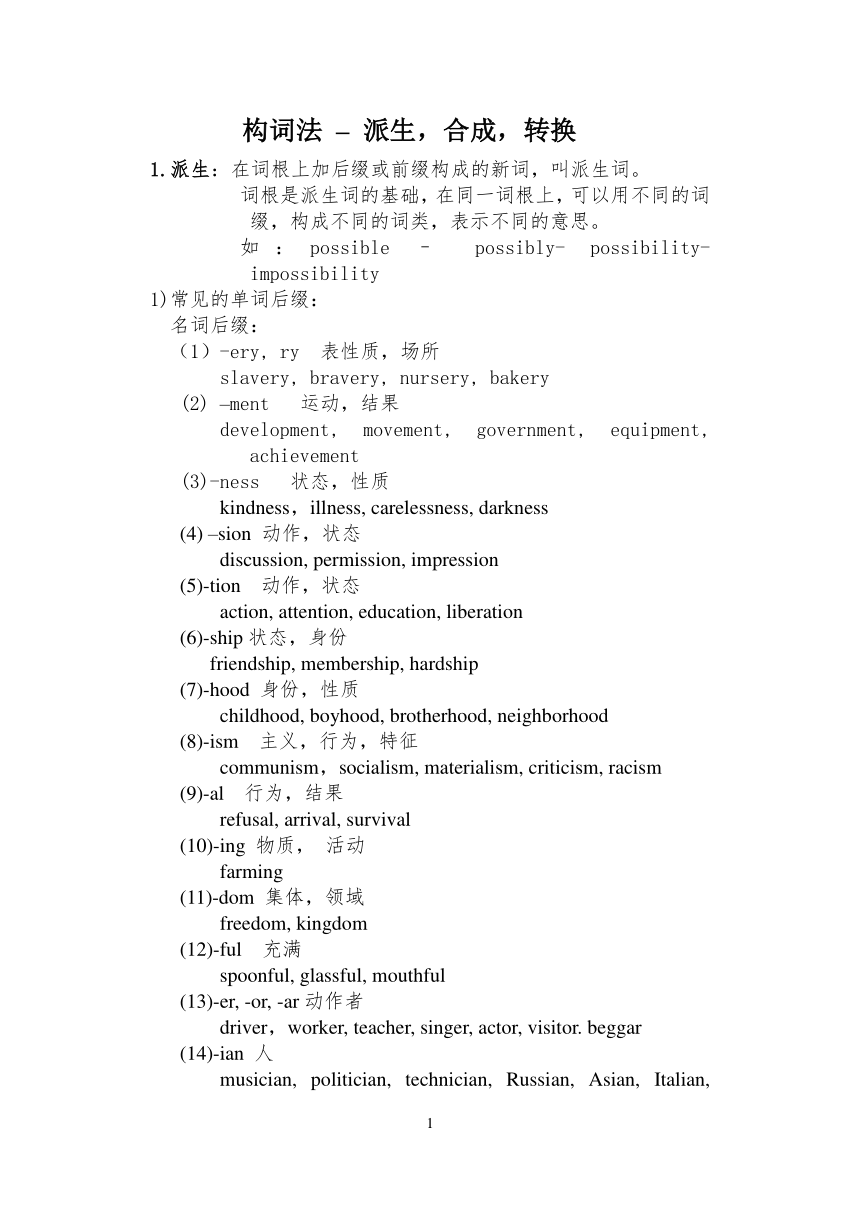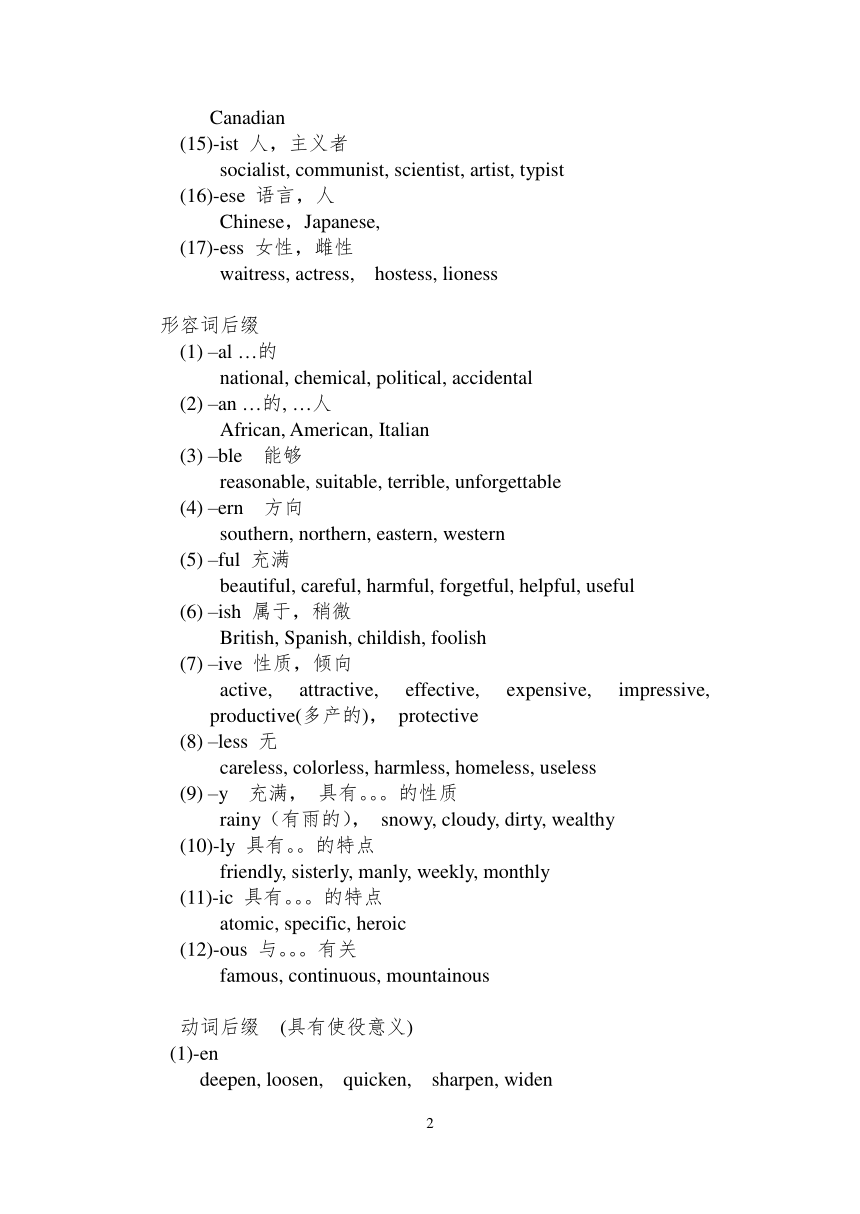构词法讲解[下学期]
图片预览


文档简介
构词法 – 派生,合成,转换
1.派生:在词根上加后缀或前缀构成的新词,叫派生词。
词根是派生词的基础,在同一词根上,可以用不同的词缀,构成不同的词类,表示不同的意思。
如:possible – possibly- possibility- impossibility
1)常见的单词后缀:
名词后缀:
(1)-ery, ry 表性质,场所
slavery, bravery, nursery, bakery
(2) –ment 运动,结果
development, movement, government, equipment, achievement
(3)-ness 状态,性质
kindness,illness, carelessness, darkness
(4) –sion 动作,状态
discussion, permission, impression
(5)-tion 动作,状态
action, attention, education, liberation
(6)-ship状态,身份
friendship, membership, hardship
(7)-hood 身份,性质
childhood, boyhood, brotherhood, neighborhood
(8)-ism 主义,行为,特征
communism,socialism, materialism, criticism, racism
(9)-al 行为,结果
refusal, arrival, survival
(10)-ing 物质, 活动
farming
(11)-dom 集体,领域
freedom, kingdom
(12)-ful 充满
spoonful, glassful, mouthful
(13)-er, -or, -ar动作者
driver,worker, teacher, singer, actor, visitor. beggar
(14)-ian 人
musician, politician, technician, Russian, Asian, Italian, Canadian
(15)-ist 人,主义者
socialist, communist, scientist, artist, typist
(16)-ese 语言,人
Chinese,Japanese,
(17)-ess 女性,雌性
waitress, actress, hostess, lioness
形容词后缀
(1) –al …的
national, chemical, political, accidental
(2) –an …的, …人
African, American, Italian
(3) –ble 能够
reasonable, suitable, terrible, unforgettable
(4) –ern 方向
southern, northern, eastern, western
(5) –ful 充满
beautiful, careful, harmful, forgetful, helpful, useful
(6) –ish 属于,稍微
British, Spanish, childish, foolish
(7) –ive 性质,倾向
active, attractive, effective, expensive, impressive, productive(多产的), protective
(8) –less 无
careless, colorless, harmless, homeless, useless
(9) –y 充满, 具有。。。的性质
rainy(有雨的), snowy, cloudy, dirty, wealthy
(10)-ly 具有。。的特点
friendly, sisterly, manly, weekly, monthly
(11)-ic 具有。。。的特点
atomic, specific, heroic
(12)-ous 与。。。有关
famous, continuous, mountainous
动词后缀 (具有使役意义)
(1)-en
deepen, loosen, quicken, sharpen, widen
(2)-ize
modernize, realize
(3)-ify, -fy
electrify, beatify,
2)常见的单词前缀
(1) dis- 不,反
discover, disappear, disobey
(2) in-, il-, im-, ir-, un- 不,非
invisible, illegal, impossible , irregular, unfair, unfit, unknown
(3) mis- 误
mistake, misunderstand
(4) non- 不
non-smoker, non-stop
(5) re- 重复,再,常和动词,名词连用
rebuild, recycle, renew, return, write
(6) co-共同,平等
cooperate, co-exist
(7) mini- 小, 常和名词连用
mini-bus, mini-skirt
(8) over- 过度
overcharge, overeat, overwork
(9) super- 超出
superpower (超级大国),superman, supermarket
(10)post- 后
post-war, post-election
(11)vice- 副
vice-chairman, vice-president
(12)tele- 远程
telephone, telegraph, telescope
(13)en- 使可能
enable, enlarge, enrich, encourage
2.合成
由两个或更多的词合成一个词,叫合成词。
1)名词合成词
(1) 名词 + 名词
bookcase, classroom,
(2) 形容词 + 名词
blackboard, deadline, expressway
(3) 副词+ 名词
overburden, under-clothes
(4) 动词+ 名词
driveway (车道), pickpocket (扒手)
(5) 名词+ 动词
haircut, headache, handshake
(6) doing+名词
washing-machine, dining-room
(7) 名词+ doing
sightseeing, handwriting
2)形容词合成词
(1) 名词+ 形容词
homesick, snow-white, duty-free (免税的)
(2) 名词+ doing
peace- loving, ocean-going (远洋的),time- saving
(3) 名词+ done
man-made, water-covered
(4) 形容词/ 副词+ doing
good-looking, hardworking,
(5) 形容词/副词+ done
newly-built, widespread ,dumb-founded
(6) 副词+ 形容词
ever-green (常青的)
(7) 形容词+形容词
wet-cold (湿冷的), icy-cold(冰冷的)
3.转换 在现代英语中,一个词可以不经过任何变化由一种词类转化为另一种或几种词类,产生新的词义,这种钩词的方法叫词类转换法。
1)转化为动词
(1)名词转化为动词
water – to water (浇水), hand – to hand (递交)
fool – to fool , ship—to ship
(2) 形容词转化为动词
dry—to dry , empty—to empty, narrow—to narrow
2)转化为名词
have (take) a look/ walk/ rest/
have a try/ smoke
take a ride / turn
PAGE
4
1.派生:在词根上加后缀或前缀构成的新词,叫派生词。
词根是派生词的基础,在同一词根上,可以用不同的词缀,构成不同的词类,表示不同的意思。
如:possible – possibly- possibility- impossibility
1)常见的单词后缀:
名词后缀:
(1)-ery, ry 表性质,场所
slavery, bravery, nursery, bakery
(2) –ment 运动,结果
development, movement, government, equipment, achievement
(3)-ness 状态,性质
kindness,illness, carelessness, darkness
(4) –sion 动作,状态
discussion, permission, impression
(5)-tion 动作,状态
action, attention, education, liberation
(6)-ship状态,身份
friendship, membership, hardship
(7)-hood 身份,性质
childhood, boyhood, brotherhood, neighborhood
(8)-ism 主义,行为,特征
communism,socialism, materialism, criticism, racism
(9)-al 行为,结果
refusal, arrival, survival
(10)-ing 物质, 活动
farming
(11)-dom 集体,领域
freedom, kingdom
(12)-ful 充满
spoonful, glassful, mouthful
(13)-er, -or, -ar动作者
driver,worker, teacher, singer, actor, visitor. beggar
(14)-ian 人
musician, politician, technician, Russian, Asian, Italian, Canadian
(15)-ist 人,主义者
socialist, communist, scientist, artist, typist
(16)-ese 语言,人
Chinese,Japanese,
(17)-ess 女性,雌性
waitress, actress, hostess, lioness
形容词后缀
(1) –al …的
national, chemical, political, accidental
(2) –an …的, …人
African, American, Italian
(3) –ble 能够
reasonable, suitable, terrible, unforgettable
(4) –ern 方向
southern, northern, eastern, western
(5) –ful 充满
beautiful, careful, harmful, forgetful, helpful, useful
(6) –ish 属于,稍微
British, Spanish, childish, foolish
(7) –ive 性质,倾向
active, attractive, effective, expensive, impressive, productive(多产的), protective
(8) –less 无
careless, colorless, harmless, homeless, useless
(9) –y 充满, 具有。。。的性质
rainy(有雨的), snowy, cloudy, dirty, wealthy
(10)-ly 具有。。的特点
friendly, sisterly, manly, weekly, monthly
(11)-ic 具有。。。的特点
atomic, specific, heroic
(12)-ous 与。。。有关
famous, continuous, mountainous
动词后缀 (具有使役意义)
(1)-en
deepen, loosen, quicken, sharpen, widen
(2)-ize
modernize, realize
(3)-ify, -fy
electrify, beatify,
2)常见的单词前缀
(1) dis- 不,反
discover, disappear, disobey
(2) in-, il-, im-, ir-, un- 不,非
invisible, illegal, impossible , irregular, unfair, unfit, unknown
(3) mis- 误
mistake, misunderstand
(4) non- 不
non-smoker, non-stop
(5) re- 重复,再,常和动词,名词连用
rebuild, recycle, renew, return, write
(6) co-共同,平等
cooperate, co-exist
(7) mini- 小, 常和名词连用
mini-bus, mini-skirt
(8) over- 过度
overcharge, overeat, overwork
(9) super- 超出
superpower (超级大国),superman, supermarket
(10)post- 后
post-war, post-election
(11)vice- 副
vice-chairman, vice-president
(12)tele- 远程
telephone, telegraph, telescope
(13)en- 使可能
enable, enlarge, enrich, encourage
2.合成
由两个或更多的词合成一个词,叫合成词。
1)名词合成词
(1) 名词 + 名词
bookcase, classroom,
(2) 形容词 + 名词
blackboard, deadline, expressway
(3) 副词+ 名词
overburden, under-clothes
(4) 动词+ 名词
driveway (车道), pickpocket (扒手)
(5) 名词+ 动词
haircut, headache, handshake
(6) doing+名词
washing-machine, dining-room
(7) 名词+ doing
sightseeing, handwriting
2)形容词合成词
(1) 名词+ 形容词
homesick, snow-white, duty-free (免税的)
(2) 名词+ doing
peace- loving, ocean-going (远洋的),time- saving
(3) 名词+ done
man-made, water-covered
(4) 形容词/ 副词+ doing
good-looking, hardworking,
(5) 形容词/副词+ done
newly-built, widespread ,dumb-founded
(6) 副词+ 形容词
ever-green (常青的)
(7) 形容词+形容词
wet-cold (湿冷的), icy-cold(冰冷的)
3.转换 在现代英语中,一个词可以不经过任何变化由一种词类转化为另一种或几种词类,产生新的词义,这种钩词的方法叫词类转换法。
1)转化为动词
(1)名词转化为动词
water – to water (浇水), hand – to hand (递交)
fool – to fool , ship—to ship
(2) 形容词转化为动词
dry—to dry , empty—to empty, narrow—to narrow
2)转化为名词
have (take) a look/ walk/ rest/
have a try/ smoke
take a ride / turn
PAGE
4
